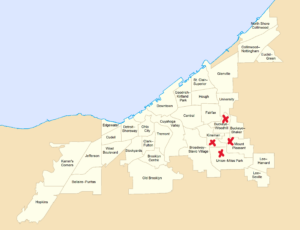Project Overview
Commodities
- Additional Plants: native plants
- Animals: bees
Practices
- Animal Production: therapeutics
- Crop Production: pollination, pollinator habitat, pollinator health
- Farm Business Management: agritourism
- Sustainable Communities: urban agriculture
Proposal summary:
Between 1826 and 1921, Mt. Pleasant thrived as rural farmland
owned by local farmers. Over the subsequent century, urbanization
has led to the migration of Cleveland's wildlife to suburban
areas and downtown, resulting in a dearth of biological diversity
in the corridor between these two zones. Mt. Pleasant's diverse
native flora habitat has experienced a steady decline,
exacerbated by a notable decrease in the population of native
pollinators.
Our project aims to address this ecological challenge by focusing
on enhancing the presence of native pollinators and native flora
in the region. We will explore the impact of increased native
flowers to see if we can increase the sightings of native
pollinators, contributing to the restoration of ecological
balance in the Kinsman corridor.
Additionally, the region surrounding our farms faces economic
challenges, with low household incomes and prevalent mental and
physical health issues among residents. As educators in urban
beekeeping and farming, we've observed the positive impact of our
educational programs on participants like ourselves. Sharing this
experience with the community at large and studying the effects
of being in close quarters of honeybees and other pollinators, we
aim to measure the benefits experienced by community members
engaging in the project.
Project objectives from proposal:
Our collaborative project, led by farmers Trey Williams and
Aharone Ben Keymah, aims to address the environmental challenges
in the Mt. Pleasant, Kinsman, Union-Miles and Buckeye-Woodhill
neighborhoods through sustainable agriculture practices. Our
two-fold approach encompasses expanding access to sustainable
gardening and positives social activities for residents through
interconnected pollinator garden installations. We then educate
the participants on pollinator identification to encourage them
to spend time in the garden observing their insect neighbors.
On the other side of this project, we invite the volunteers and
residents along with other local farmers and people in the food
system to participate and relax in our bee beds on a regular
schedule. The impact of close exposure to Honeybees for our
residents, volunteers and especially local farmers may help lower
stress levels and increase the economic vitality of their
personal projects. This type of therapy is comparable to
treatment with horses, dolphins, etc., but is simpler, because
sleeping on a bed is easy.
1. Improving Environmental and Social Sustainability:
- Pollinator Gardens and Migration Stations: Our project involves
strategically establishing native pollinator gardens and
migration stations across the target neighborhoods. This network
will create corridors for wildlife and contribute to the overall
health of the regional environmental ecosystem.
- Community Engagement: Through planned cohorts and volunteer
opportunities, community members will actively participate in
creating and maintaining these green spaces. This engagement not
only supports the environment but also fosters a sense of
community ownership and responsibility. We will encourage
participants to start a garden club in the area after or during
the project.
2. Studying the Impact of Bee Exposure:
- Research Design: We will implement a research study to analyze
the effects of bee exposure on volunteer community members. This
will involve documenting experiences before, during and after bee
bed therapy opportunities.
- Bee Bed Therapy Sessions: Integrating therapeutic sessions
involving bee beds, we aim to explore the potential mental health
benefits for participating volunteers, residents and local
farmers by engaging with bees. This unique approach connects
sustainable beekeeping practices with wellness, fostering a
holistic understanding of the environment's impact on community
health possibly leading to less stress and improved efficiency in
the participants lives.
- Data Collection: Gathering qualitative and quantitative data on
mental health, stress levels, and overall well-being, we aim to
identify potential positive impacts on individuals engaging with
bees regularly.
Objectives:
(1) Increase honeybee and general
pollinator population within the Mt. Pleasant, Union -Miles,
Kinsman, and Buckeye-Woodhill neighborhoods by planting 20
pollinator gardens within the 23-month project
period,
(2) Educate approximately 50
neighborhood residents and volunteers on how to grow their own
pollinator gardens through two 6-month cohorts (April -
Sept),
(3) decrease the barrier to
access by providing access to all tools and resources to cohort
participants, including but not limited to seeds & seedlings,
garden hand tools, containers, labor, etc.,
(4) install 1 bee bed structure
with 4 hives for the purposes of wellness therapy studies.
